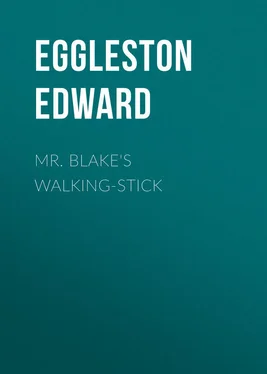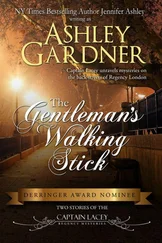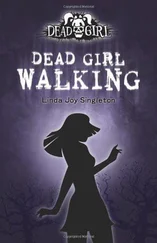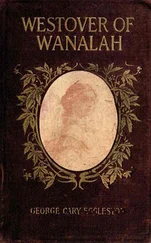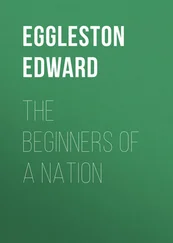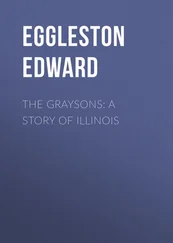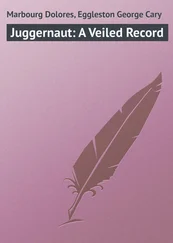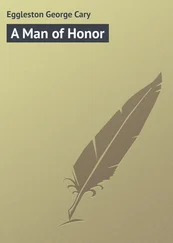Edward Eggleston - Mr. Blake's Walking-Stick
Здесь есть возможность читать онлайн «Edward Eggleston - Mr. Blake's Walking-Stick» — ознакомительный отрывок электронной книги совершенно бесплатно, а после прочтения отрывка купить полную версию. В некоторых случаях можно слушать аудио, скачать через торрент в формате fb2 и присутствует краткое содержание. Издательство: Иностранный паблик, Жанр: foreign_antique, foreign_prose, на английском языке. Описание произведения, (предисловие) а так же отзывы посетителей доступны на портале библиотеки ЛибКат.
- Название:Mr. Blake's Walking-Stick
- Автор:
- Издательство:Иностранный паблик
- Жанр:
- Год:неизвестен
- ISBN:нет данных
- Рейтинг книги:4 / 5. Голосов: 1
-
Избранное:Добавить в избранное
- Отзывы:
-
Ваша оценка:
- 80
- 1
- 2
- 3
- 4
- 5
Mr. Blake's Walking-Stick: краткое содержание, описание и аннотация
Предлагаем к чтению аннотацию, описание, краткое содержание или предисловие (зависит от того, что написал сам автор книги «Mr. Blake's Walking-Stick»). Если вы не нашли необходимую информацию о книге — напишите в комментариях, мы постараемся отыскать её.
Mr. Blake's Walking-Stick — читать онлайн ознакомительный отрывок
Ниже представлен текст книги, разбитый по страницам. Система сохранения места последней прочитанной страницы, позволяет с удобством читать онлайн бесплатно книгу «Mr. Blake's Walking-Stick», без необходимости каждый раз заново искать на чём Вы остановились. Поставьте закладку, и сможете в любой момент перейти на страницу, на которой закончили чтение.
Интервал:
Закладка:
Edward Eggleston
Mr. Blake's Walking-Stick / A Christmas Story for Boys and Girls
I have meant to furnish a book that would serve for a Christmas present to Sunday-scholars, either from the school or from their teachers. I hope it is a story, however, appropriate to all seasons, and that it will enforce one of the most beautiful and one of the most frequently forgotten precepts of the Lord Jesus.
EDWARD EGGLESTON.CHAPTER I
Some men carry canes. Some men make the canes carry them. I never could tell just what Mr. Blake carried his cane for. I am sure it did not often feel his weight. For he was neither old, nor rich, nor lazy.
He was a tall, straight man, who walked as if he loved to walk, with a cheerful tread that was good to see. I am sure he didn’t carry the cane for show. It was not one of those little sickly yellow things, that some men nurse as tenderly as Miss Snooks nurses her lap-dog. It was a great black stick of solid ebony, with a box-wood head, and I think Mr. Blake carried it for company. And it had a face, like that of an old man, carved on one side of the box-wood head. Mr. Blake kept it ringing in a hearty way upon the pavement as he walked, and the boys would look up from their marbles when they heard it, and say: “There comes Mr. Blake, the minister!” And I think that nearly every invalid and poor person in Thornton knew the cheerful voice of the minister’s stout ebony stick.
It was a clear, crisp, sunshiny morning in December. The leaves were all gone, and the long lines of white frame houses that were hid away in the thick trees during the summer, showed themselves standing in straight rows now that the trees were bare. And Purser, Pond & Co.’s great factory on the brook in the valley below was plainly to be seen, with its long rows of windows shining and shimmering in the brilliant sun, and its brick chimney reached up like the Tower of Babel, and poured out a steady stream of dense, black smoke.
It was just such a shining winter morning. Mr. Blake and his walking-stick were just starting out for a walk together. “It’s a fine morning,” thought the minister, as he shut the parsonage gate. And when he struck the cane sharply on the stones it answered him cheerily: “It’s a fine morning!” The cane always agreed with Mr. Blake. So they were able to walk together, according to Scripture, because they were agreed.
Just as he came round the corner the minister found a party of boys waiting for him. They had already heard the cane remarking that it was a fine morning before Mr. Blake came in sight.
“Good morning! Mr. Blake,” said the three boys.
“Good morning, my boys; I’m glad to see you,” said the minister, and he clapped “Old Ebony” down on the sidewalk, and it said “I am glad to see you.”
“Mr. Blake!” said Fred White, scratching his brown head and looking a little puzzled. “Mr. Blake, if it ain’t any harm – if you don’t mind, you know, telling a fellow, – a boy, I mean – ” Just here he stopped talking; for though he kept on scratching vigorously, no more words would come; and comical Sammy Bantam, who stood alongside, whispered, “Keep a-scratching, Fred; the old cow will give down after a while!”
Then Fred laughed, and the other boys, and the minister laughed, and the cane could do nothing but stamp its foot in amusement.
“Well, Fred,” said the minister, “What is it? speak out.” But Fred couldn’t speak now for laughing, and Sammy had to do the talking himself. He was a stumpy boy, who had stopped off short; and you couldn’t guess his age, because his face was so much older than his body.
“You see, Mr. Blake,” said Sammy, “we boys wanted to know, – if there wasn’t any harm in your telling, – why, we wanted to know what kind of a thing we are going to have on Christmas at our Sunday-school.”
“Well, boys, I don’t know any more about it yet than you do. The teachers will talk it over at their next meeting. They have already settled some things, but I have not heard what.”
“I hope it will be something good to eat,” said Tommy Puffer. Tommy’s body looked for all the world like a pudding-bag. It was an india-rubber pudding-bag, though. I shouldn’t like to say that Tommy was a glutton. Not at all. But I am sure that no boy of his age could put out of sight, in the same space of time, so many dough-nuts, ginger-snaps, tea-cakes, apple-dumplings, pumpkin-pies, jelly-tarts, puddings, ice-creams, raisins, nuts, and other things of the sort. Other people stared at him in wonder. He was never too full to take anything that was offered him, and at parties his weak and foolish mother was always getting all she could to stuff Tommy with. So when Tommy said he hoped it would be something nice to eat, and rolled his soft lips about, as though he had a cream tart in his mouth, all the boys laughed, and Mr. Blake smiled. I think even the cane would have smiled if it had thought it polite.
“I hope it’ll be something pleasant,” said Fred Welch.
“So do I,” said stumpy little Tommy Bantam.
“So do I, boys,” said Mr. Blake, as he turned away; and all the way down the block Old Ebony kept calling back, “So do I, boys! so do I!”
Mr. Blake and his friend the cane kept on down the street, until they stood in front of a building that was called “The Yellow Row.” It was a long, two-story frame building, that had once been inhabited by genteel people. Why they ever built it in that shape, or why they daubed it with yellow paint, is more than I can tell. But it had gone out of fashion, and now it was, as the boys expressed it, “seedy.” Old hats and old clothes filled many of the places once filled by glass. Into one room of this row Mr. Blake entered, saying: —
“How are you, Aunt Parm’ly?”
“Howd’y, Mr. Blake, howd’y! I know’d you was a-comin’, honey, fer I hyeard the sound of yer cane afore you come in. I’m mis’able these yer days, thank you. I’se got a headache, an’ a backache, and a toothache in de boot.”
I suppose the poor old colored woman meant to say that she had a toothache “to boot.”
“You see, Mr. Blake, Jane’s got a little sumpin to do now, and we can git bread enough, thank the Lord, but as fer coal, that’s the hardest of all. We has to buy it by the bucketful, and that’s mity high at fifteen cents a bucket. An’ pears like we couldn’t never git nothin’ a-head on account of my roomatiz. Where de coal’s to come from dis ere winter I don’t know, cep de good Lord sends it down out of the sky and I reckon stone-coal don’t never come dat dar road.”
After some more talk, Mr. Blake went in to see Peter Sitles, the blind broom-maker.
“I hyeard yer stick, preacher Blake,” said Sitles. “That air stick o’ yourn’s better’n a whole rigimint of doctors fer the blues. An’ I’ve been a havin’ on the blues powerful bad, Mr. Blake, these yer last few days. I remembered what you was a-saying the last time you was here, about trustin’ of the good Lord. But I’ve had a purty consid’able heartache under my jacket fer all that. Now, there’s that Ben of mine,” and here Sitles pointed to a restless little fellow of nine years old, whose pants had been patched and pieced until they had more colors than Joseph’s coat. He was barefoot, ragged, and looked hungry, as some poor children always do. Their minds seem hungrier than their bodies. He was rocking a baby in an old cradle. “There’s Ben,” continued the blind man, “he’s as peart a boy as you ever see, preacher Blake, ef I do say it as hadn’t orter say it. Bennie hain’t got no clothes. I can’t beg. But Ben orter be in school.” Here Peter Sitles choked a little.
Читать дальшеИнтервал:
Закладка:
Похожие книги на «Mr. Blake's Walking-Stick»
Представляем Вашему вниманию похожие книги на «Mr. Blake's Walking-Stick» списком для выбора. Мы отобрали схожую по названию и смыслу литературу в надежде предоставить читателям больше вариантов отыскать новые, интересные, ещё непрочитанные произведения.
Обсуждение, отзывы о книге «Mr. Blake's Walking-Stick» и просто собственные мнения читателей. Оставьте ваши комментарии, напишите, что Вы думаете о произведении, его смысле или главных героях. Укажите что конкретно понравилось, а что нет, и почему Вы так считаете.
